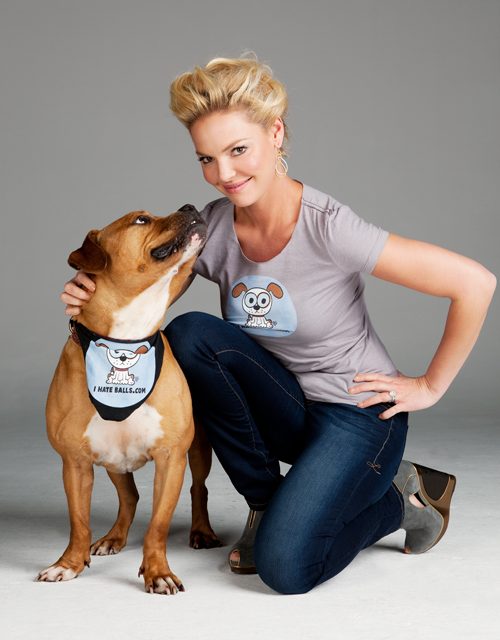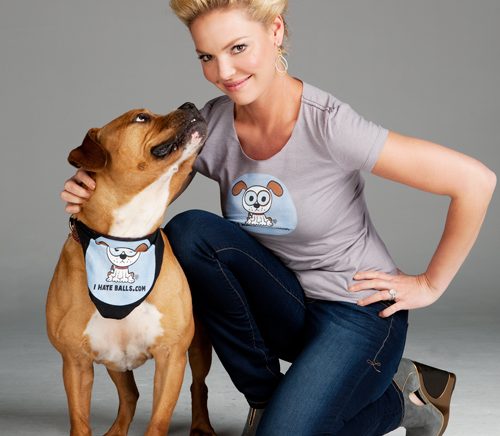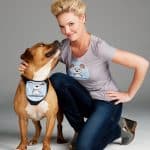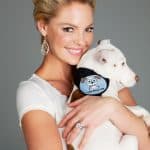

Katherine Heigl Means Business
An exclusive interview
I once overheard someone say something about the city of Paris along the lines of: “Ah Paris, you either love it or hate it.” It stuck with me, that assertion, and over time I came to believe in its accuracy. No one was ever on the fence— comme ci, comme ça—about Paris; people really did either seem to love it or hate it. Over time, it also came to me that the same could be said for any number of things: Brussels sprouts, roller coasters, Dostoyevsky.
When I recently learned I’d be interviewing A-lister—sorry, A+ lister—Katherine Heigl, however, and started poking around to get a better sense of who she is as a person, one thing swiftly dawned on me. Katherine Heigl is nothing like Paris or Brussels sprouts. Everyone—no, really, everyone—loves her. One of the few names on a short list of big stars no one seems to have any of the proverbial dirt on, Heigl has occupied a special place in the hearts of fans for well over a decade, appearing in some of this generation’s favourite hits on the big and small screen alike. But for a woman loved by everyone, she herself famously expresses unabashed disdain for one thing—make that two things—with her much-forwarded Funny or Die mockumercial. A viral clip that shot around the Internet at breakneck speeds, IHateBalls.com serves as the forum for an undeniably effective pro-spay/neuter campaign.
In what is arguably one of the most memorable pieces of animal overpopulation-control communication ever, she sarcastically tells viewers: “A lot of people say to me ‘Katherine, you promote neutering so much, you must really love animals.’ I’m like: ‘Yeah, they’re okay, I guess. But the real reason I’m so pro-neutering is… I hate balls.”
Successfully comedic, powerfully dramatic, admirably philanthropic, and, ugh, downright gorgeous, as far as I’m concerned, like Paris, Katherine Heigl’s only flaw is that she is, quite simply, just too hot. But that’s not dislike talking. That’s only the sound of envy.
MD: Where are you from originally? And where are you based now?
KH: I grew up in Connecticut. In a little suburb town called New Canaan. I moved to LA when I was 17. Now, we split our time between there and Utah. Our home in Utah was intended to be sort of a weekend place, but it’s so beautiful, really we’re based in Utah now. My dogs love it here too.
MD: What effect did modeling (for Sears and Lord & Taylor) ultimately have on your desire to pursue a career as an actor?
KH: I started modeling when I was nine and it was a new world to my family. When you’re a child model, your reps are also your agents. And they send you out on everything. I’d done a couple commercials, and booked my first film when I was 11, and that was it. I knew acting would be the career. Well, actually, at 11 maybe I wasn’t thinking about it in terms of it being a career.
MD: You’ve spent a monumental percentage of your life in front of the camera. Do you gravitate more towards portraying an on-going character on the small screen or towards portraying a character’s swifter arc on the big screen?
KH: That’s a tough one. I’ve had some amazing experiences on TV as a series regular. To have the opportunity to get to keep discovering things about the character and to get to keep doing your craft every day, to learn how to keep your energy up, with honesty and integrity—it’s such a great training tool. It’s been a real blessing. But I think I probably prefer film. For three months, it’s on. You get the opportunity to start the character and then, three months later, end the character in this neat, buttoned-up way.
MD: In 2007, you were awarded an Emmy for your work on Grey’s Anatomy. What do you most admire about Dr. Izzie Stevens?
KH: The character and I pretty much grew together. It started as a pilot—as a certain thing—and just evolved over the years. She had a lot of moral integrity and compassion and was this very strong woman. She went through very difficult circumstances, she had to give a child up and put herself through med school. It was very difficult for me to leave her.
MD: In 2006, you filmed what can only be described an instant hit, Knocked Up. What was it like working with comedic superstars Judd Apatow, Paul Rudd, Seth Rogen, and Leslie Mann?
KH: It was probably one of the best filming experiences of my career. Really, an unbelievable experience that changed my life. They’re all so such incredible comedic talents, it was an intimidating set to be on. I spent a lot of time just watching and learning. They would do all this improv and just throw the hilarity out there. They taught me to take a risk. To just go for it. To not worry if it was funny or not.
MD: You’ve worked opposite Ashton Kutcher [The Killers], Gerard Butler [The Ugly Truth] and Josh Duhamel [Life As We Know It]. What’s it like to head for “a day at the office” knowing this is the caliber of leading men you’ll be working with?
KH: It’s pretty fun. I really can’t complain. My job is to show up at work, get my hair and make-up done, then put on someone else’s awesome clothes—depending on the character, of course—then go and work with beautiful men. It’s pretty satisfying. And all of them are such outgoing, gregarious personalities.
MD: Professionally, what have you not yet tackled that one day you would like to?
KH: As my career is evolving, I’ve found the idea of producing interesting. I never wanted to direct, but now I’m getting the director’s bug. I’m not sure I’ll ever do it, but it really fascinates me. There are so many levels of creativity. And there’s nothing to me more thrilling than being challenged.
MD: In 2009, you and your husband [musician Josh Kelley] adopted your daughter Nancy Leigh [Naleigh] from South Korea. How has expanding your family in this way enriched your life?
KH: I always wanted to be a mother. I’d always imagined having a big family. I was raised Mormon and we were a small, big-family in that sense. There’s something so grounding about being a mother. Feeling all that love for a child is so rewarding. It really puts life in perspective. I hope we have more kids. I’d love for her to have siblings.
MD: Before the arrival of Naleigh, you were mom to fourlegged kids. What animals do you currently share your home with? And how did having them help prepare you for Naleigh’s arrival?
KH: We have Romeo, Piper, Oscar, Stella, Wheezer, Flora May, and Tambour. Plus three cats. They taught me about unconditional love and helped me learn responsibility and how to care for the ones we love.
MD: What is it about animal rescue that makes you so passionate?
KH: Animals are the voiceless and the innocent and they need to be treated with the respect and care they deserve. There is a quote by Emile Zola that I believe to be true. “The fate of animals is of greater importance to me than the fear of appearing ridiculous. It is indissolubly connected with the fate of men.”
MD: What do you do with your kids, four-legged and two-legged, when you’re on set?
KH: I always bring Romeo, my first Schnauzer, who’s now very old, with me and the rest stay with a pet sitter who’s wonderful to them. Naleigh always comes with me.
MD: You’ve been an active supporter of Best Friends Animal Society, in particular their Pup My Ride program. Can you tell us what the program is and why you feel it’s an important one?
KH: Transporting small dogs out of LA shelters is one way to bring the euthanizing numbers down. Our foundation now funds our own transports in a big, well-equipped bus we bought. We move anywhere from 50 to 75 dogs twice a month from death row to other approved shelters and rescues where they are easily adopted. The ultimate solution is spay/neuter and although we fund a lot of that, our transport program is an immediate solution for so many abandoned animals that were going to be euthanized.
MD: Have you always been an “animal person?”
KH: Yes. My whole family has always valued and respected the animals we’ve had. And there were many! We all believe animals enrich our lives in ways that are immeasurable.
MD: In 1986, you lost your brother, Jason, in a car accident. What was the inspiration for you and your mom, Nancy, to launch the Jason Debus Heigl Foundation?
KH: Jason and his innate compassion and love of life were the inspiration. That, and our growing knowledge of the horrible situation for many domestic animals. Jason would have been, as are we, appalled by how many healthy, adoptable animals we’re killing every year in our country alone. We formally founded the foundation about four years ago but began helping many years before when we became aware of what was happening.
MD: What are the aims of the foundation? And what has been the most rewarding experience for you, being an active part of the foundation?
KH: The foundation’s goal is very simple, but a complicated one to achieve: a no-kill nation. Because we are dealing with far too many animals in shelters to immediately save them all, I try to focus on the ones we get out and the major spay/neuter programs we are funding to help prevent more unwanted animals ending up being euthanized. All of us who are an active part of the foundation constantly remind ourselves, in the midst of such sadness, of the value of “the one.” Even though we can’t save them all right now, every one we save is a victory and keeps us heading in the right direction.
MD: You’ve been on numerous Most Beautiful People lists and appeared on the covers of magazines like Vanity Fair, Maxim, and Cosmopolitan. And now, Modern Dog. How do you keep your eye on that which truly matters, in an industry that so clearly values appearances?
KH: My family has always kept me grounded and taught all of us that there is far more to life then perpetual personal concern. I’ve been taught—and I learned—the difference between the temporary and the eternal about our lives.
MD: If you overheard two people talking, and one of them admitted they were on their way to go buy a dog, would you feel comfortable interjecting on why they may want to consider adopting over shopping? If so, what reasons would you give them?
KH: Yes, but hopefully in a polite manner. And the reason comes down to one statistic: For every pet someone buys, at least 10 adoptable pets will die. Shelter animals are the best pets in the world and are waiting for us as a community and nation to begin to recognize their special value.
MD: With a long list of accolades and achievements already under your belt, what are you most proud of as a woman today?
KH: My compassion. And I owe this to my mother. With the foundation we’ve started in my brother’s name, we really put our money where our mouth is, to try to make a real difference. It’s really easy to get consumed by your own goals, and to forget that there’s a whole world out there.
Join the newsletter and never miss out on dog content again!
"*" indicates required fields
By clicking the arrow, you agree to our web Terms of Use and Privacy & Cookie Policy. Easy unsubscribe links are provided in every email.

